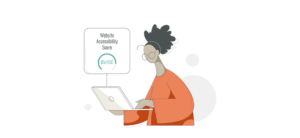The accessibility of your website is crucial. Not only does it provide an inclusive experience for all users, it also mitigates the risk of costly ADA lawsuits.
Here are the top 3 issues that get you sued.
- The Law Requires Your Website Be Accessible
The Americans with Disabilities Act (ADA) guarantees equal opportunity for individuals with disabilities in public accommodations. The Department of Justice (DOJ), the primary federal government agency responsible for enforcing the ADA, has taken the position that this applies to all public-facing websites. This means your site should be navigable and understandable for everyone, including those with visual, auditory, cognitive, and physical impairments. Failure to comply can result in severe penalties. Website ADA-related lawsuits have skyrocketed in recent years.
- Absence of an Accessibility Statement on Your Website
An properly written accessibility statement on your site is not just a sign of commitment towards inclusivity; it’s also a protective measure against potential lawsuits. This statement outlines your efforts to ensure your site is accessible and provides a point of contact for accessibility-related concerns. A lack of this statement can seen as neglecting your duty towards accessibility, increasing your risk of legal action.
- Using an Accessibility Widget
25% of lawsuits in 2023 were against websites using an accessibility widget. Accessibility widgets can only address about 30% of accessibility issues. These tools fail to address the majority of accessibility requirements, leaving you vulnerable to lawsuits.
“The promise to prevent ADA lawsuits by using an accessibility widget or overlays isn’t real. Many lawsuits list widgets and overlay features as a barrier to equal access in addition to other inaccessible aspects of the website. This means these approaches give plaintiffs more claims to add to a lawsuit, not less.”
~~ Usablenet: “App & Web Accessibility Lawsuits Break Records”
To truly protect your business, you need a comprehensive, human led approach that ensures every aspect of your site meets the necessary standards.
Website accessibility is not just about avoiding lawsuits—it’s about opening your business up to a much wider audience, boosting your SEO rankings and demonstrating social responsibility. Don’t wait until a complaint or lawsuit forces your hand. Be proactive, make your website accessible and reap the benefits that come with inclusivity.














